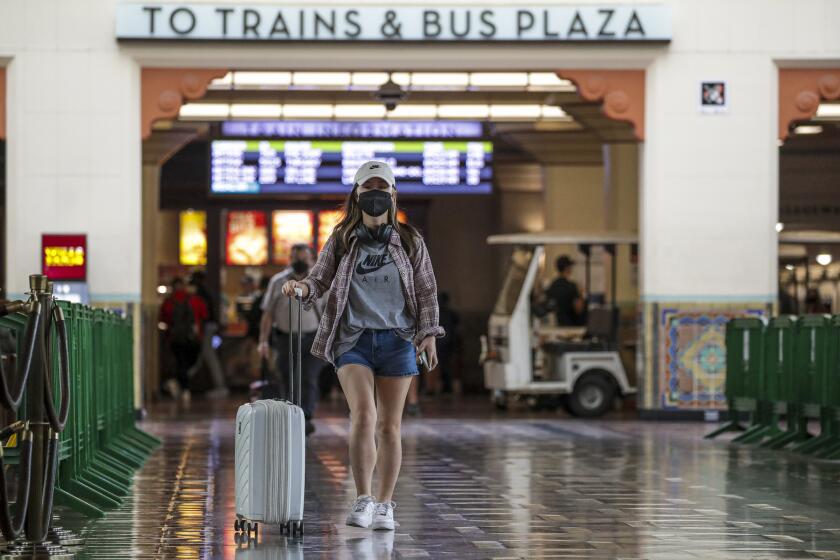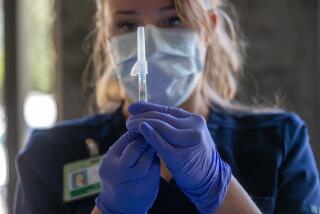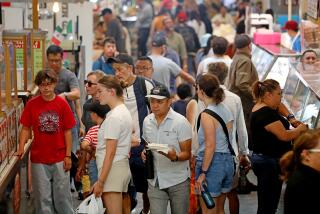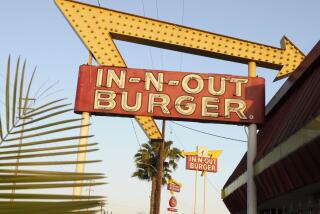‘It’s sort of like we’re back to 2020’: L.A. dining scene braces for possible indoor masking return
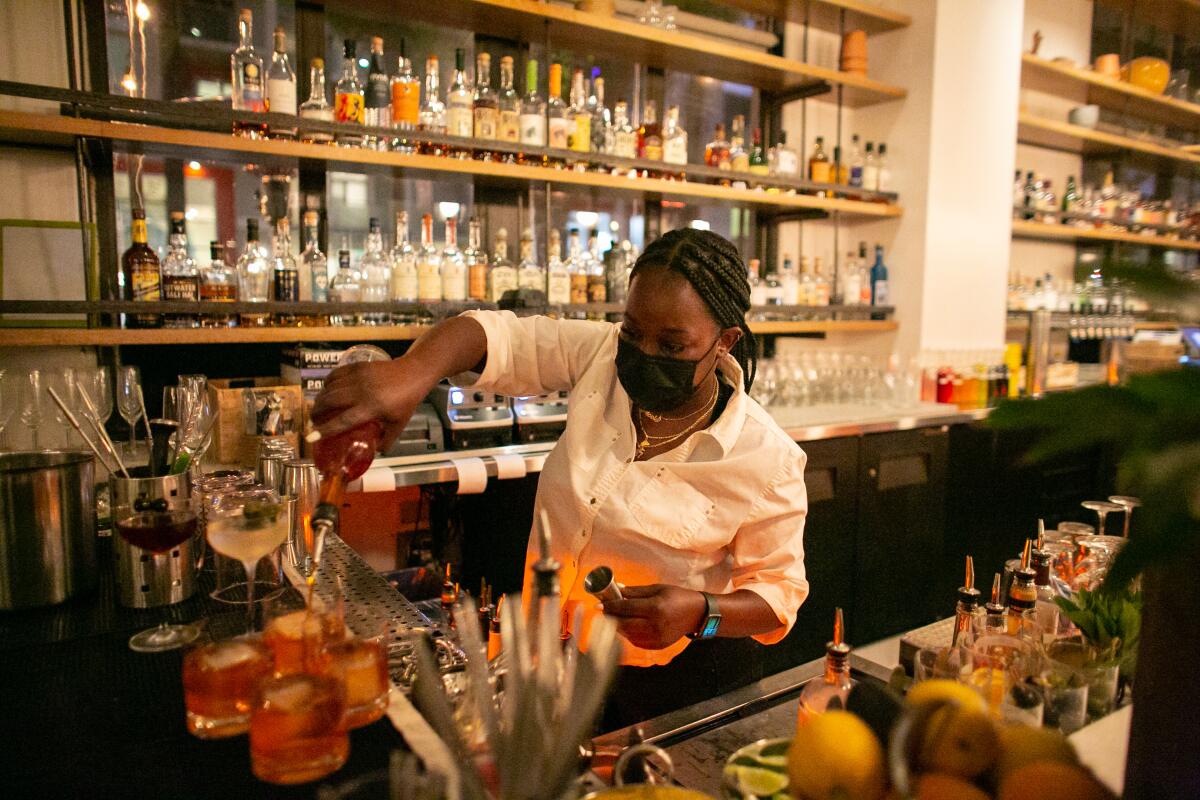
As Los Angeles hurtles toward a possible return of a countywide indoor mask mandate, restaurateurs and bar owners are bracing for a new wave of backlash and enforcement difficulties — reminiscent of many of their industry’s hardships during the pandemic-spurred pivots and rapidly evolving dining regulations of 2020 and 2021.
But in an encouraging development, fresh figures are showing a slight flattening in new infections and hospitalizations. Nonetheless, the dining industry remained on edge.
If Los Angeles County remains in the “high” community level through Thursday, recording at least 10 new weekly coronavirus-positive hospitalizations for every 100,000 residents, a countywide mask mandate would take effect Friday and require masks worn indoors by anyone over the age of 2 in a host of settings: gyms, office spaces, shops, educational facilities, supermarkets and restaurants and bars among them.
Concerns extend far beyond whether the return of indoor masking will decrease sales, as some have already noticed a decline during the current COVID-19 wave driven by the highly infectious BA.5 Omicron subvariant. To many, a return to a mask mandate could mean a reprisal of angry and unruly customers, a problem exacerbated by already skeletal staffing.
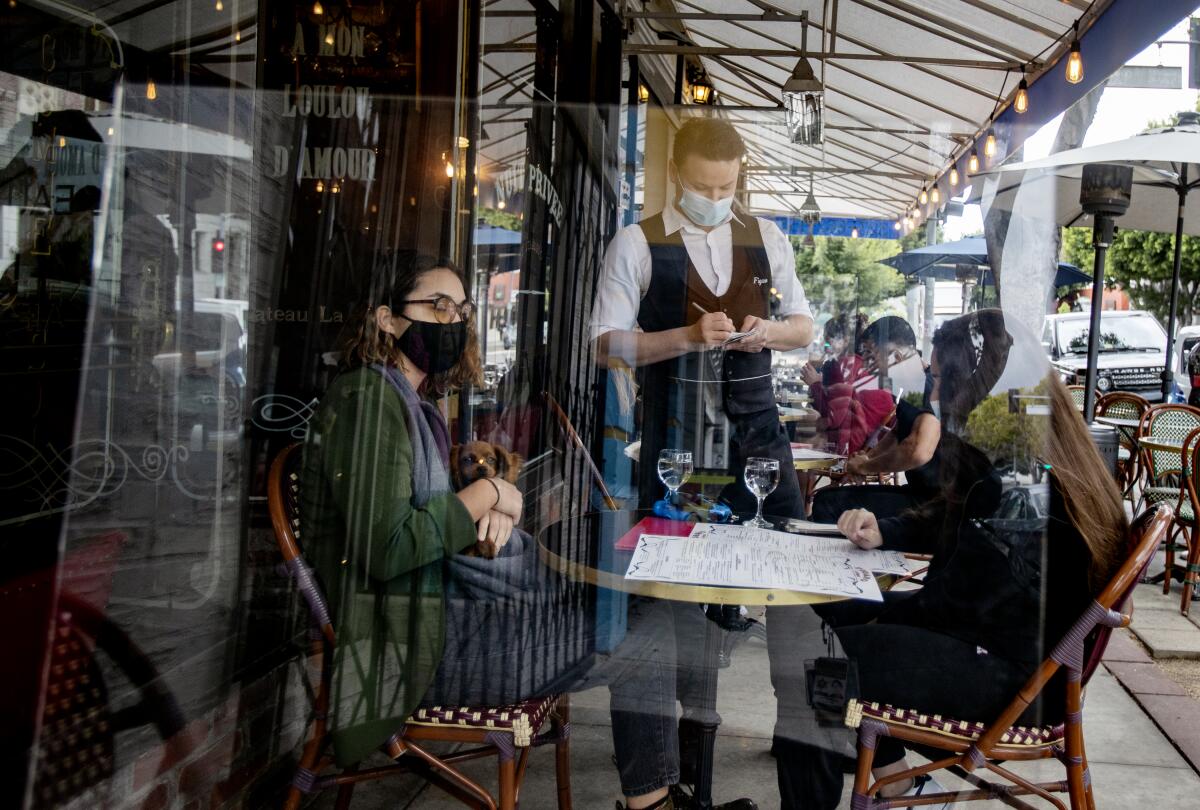
Robert Fleming managed to avoid the pandemic’s first two years of pivots and regulation of customers, as the coronavirus and supply chain issues impeded the construction and opening of his Eagle Rock bar, Capri Club, which launched in June. Should the county return to indoor masking this week, it would mark the first time Fleming would have to navigate masking regulations as a business owner.
“I’m fearful and I’m nervous and there’s a lot of anxiety behind it,” he said. “I really dodged a bullet by not being open during a lot of this; I’m a little out of sorts, just because I have so many peers that went through so much.”
Should an indoor mask mandate return in L.A. County, his bar’s team will comply and the staff will wear masks, though they’re all wary of enforcing indoor masking for customers. Logistically, it presents a challenge in the 39-seat space: There is no table service; all orders are placed at the bar. Customers seated at the bar would be allowed to remove their masks, but those ordering at the bar, in the seated guests’ close proximity, would not.
Even if restaurant and bar owners are in a financial position to hire staff specifically to enforce the guideline, national labor shortages — particularly in the restaurant industry, rife with historically low pay and grueling work conditions — make the hiring pool especially tight.
The order, which could go into effect as soon as July 29, has raised concerns among business groups and sparked questions about its necessity.
Capri Club’s staffing is lean as it currently stands, with two bartenders, a barback and a food runner on the floor at any given time, often fulfilling orders for customers standing two or three deep around the bar. Last week, due to the possible COVID-19 exposure of an employee, Capri Club closed entirely for one night because of lack of staffing.
Hiring extra staff to enforce vaccination and mask mandates would be nearly impossible, Fleming said.
“The county doesn’t give us any resources beyond what they list on their website and what they have available, documentation-wise,” he said. “But for one restaurateur who is understaffed — and every restaurateur I know in the county is understaffed — it’s definitely a big ask to presume that we could just manifest out of thin air an extra body in there, or an extra person to be strict about enforcing it.”
As an owner-operator, he feels pulled between the choices and fears how customers could react against strict enforcement.
“If I’m being blunt, you know, that’s always gonna be the thing that keeps me up at night,” Fleming said, adding: “Damned if you do, damned if you don’t.”
L.A. County Public Health Director Barbara Ferrer has stated that if the county does return to indoor masking, she hopes it is brief. On Thursday she noted that if the county’s case numbers showed promise in slowing, a mandate could be postponed.
Maria Salinas, the president and chief executive of the Los Angeles Area Chamber of Commerce, and Jessica Lall, president and chief executive of the Central City Assn., recently contacted Ferrer, writing that the indoor mask mandate “puts employees in the increasingly challenging position of enforcing a mandate that many customers no longer wish to — or are unwilling to — comply with.”
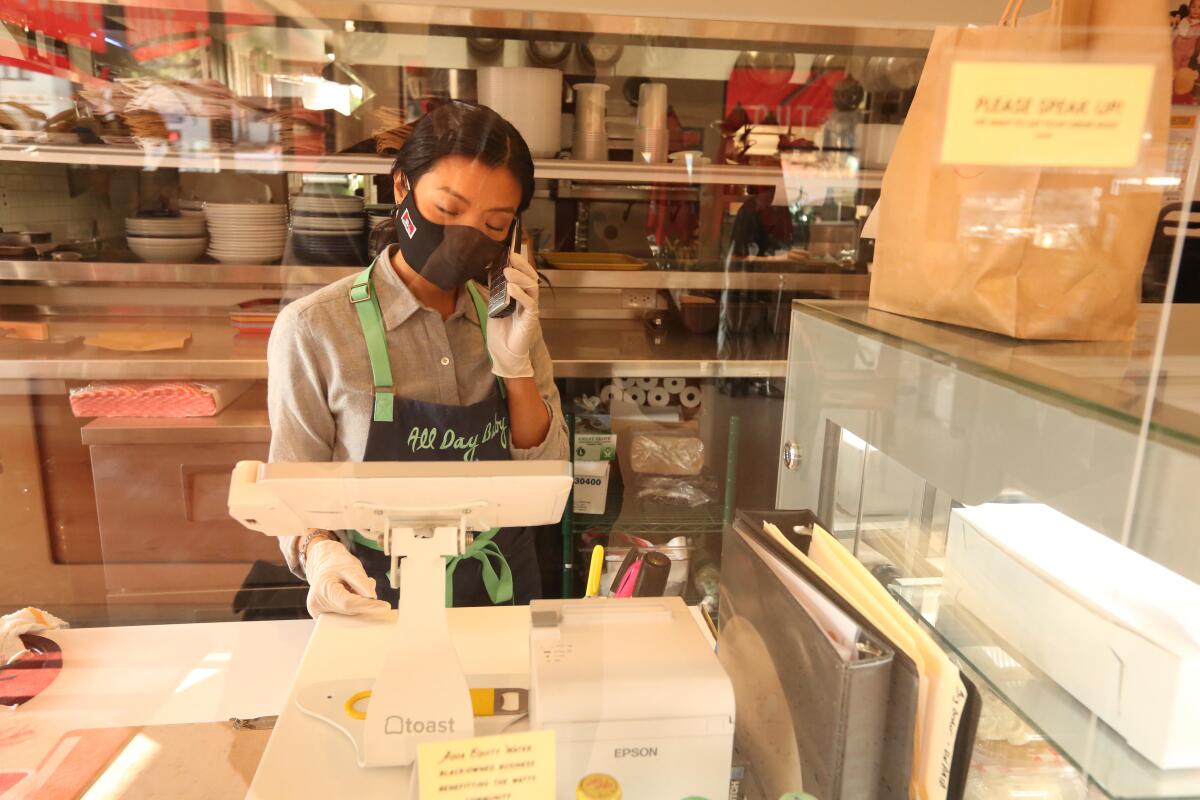
Lien Ta, co-owner of Silver Lake’s All Day Baby and Koreatown’s Here’s Looking at You, is also concerned with customer response. “Policing people at the door” is “the opposite of hospitality,” Ta said, and she and her staff have had less than polite interactions enforcing mask mandates in the past.
“Business is just really, really hard, and then on top of it, if people are yelling at you, it just makes it harder,” she said.
Ta and her teams have weathered the pandemic operating two very different restaurants. All Day Baby is more casual and allows for outdoor seating, while Here’s Looking at You is roughly half the size and indoor-only; the operator believes that the return of indoor masking could have drastically disparate outcomes at each.
L.A. restaurants and bars are in the yellow tier, unveiling new menus and renovations.
Masks are already optional for her staff at both restaurants, though many employees haven’t stopped indoor masking during service. She also notes that many customers have also voluntarily begun donning masks indoors during the latest surge, though she knows that not all customers will feel as amenable.
“It’s hard getting people to keep a mask on at the grocery store, let alone at a restaurant where they say, ‘We’re just going to take it off anyway.’ It’s very difficult to manage that kind of obstinate behavior,” Ta said. “I’m not really looking forward to that, and frankly, I don’t have the energy.”
At All Day Baby, which offers patio seating, the higher volume of customers could account for a larger amount of negative feedback, though the space could offset some of it with outdoor dining. Here’s Looking at You does not offer outdoor dining, though it did earlier in the pandemic, flipping its seating to an entirely al fresco sidewalk setup. These days, Ta said, she simply does not have the resources to convert her restaurant again, and she does not have the staff to cook for additional diners.
And she’s already noticed a dip in customers. Normally the Koreatown restaurant’s bar can accommodate roughly 30 walk-in diners over the course of an evening; recently, only two sat down.
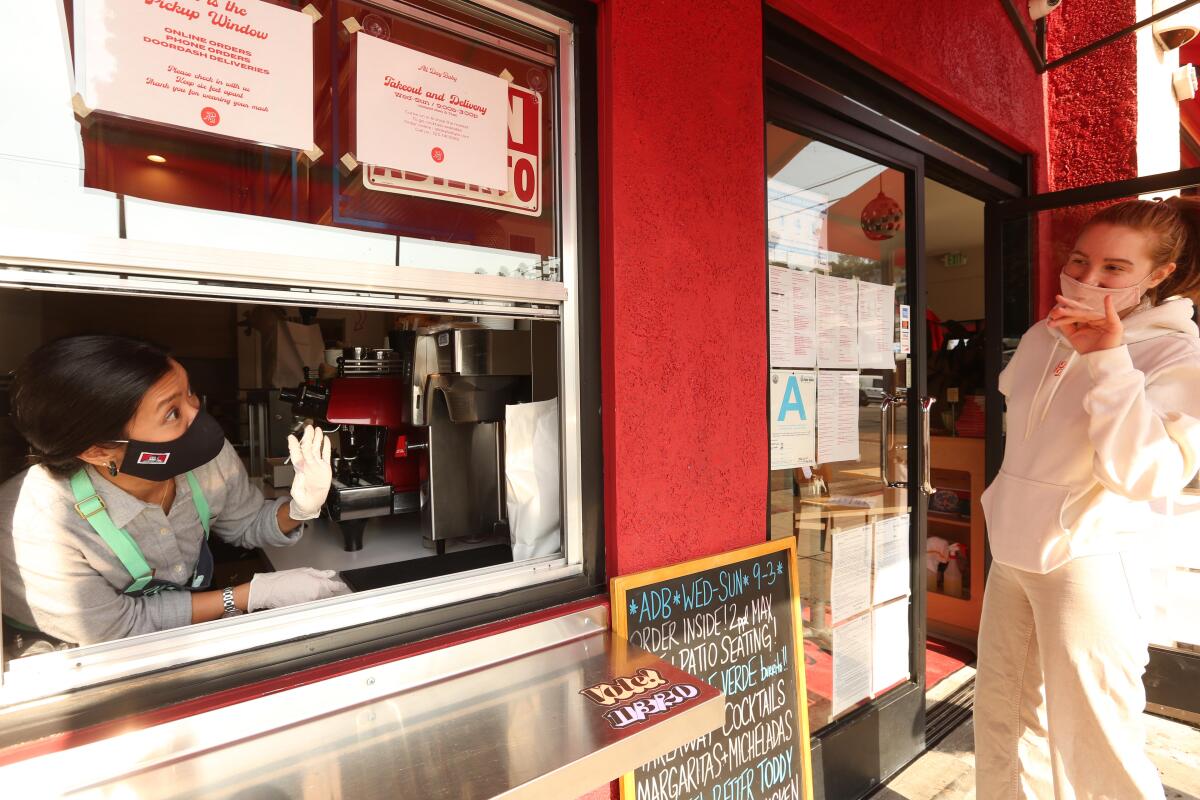
Conversely, at All Day Baby, the crowd has slowed on weekdays; the more casual of her two restaurants, she admits, is more easily cut from the plans of a cautious or pandemic-wary customer than Here’s Looking at You, which sees more special-occasion celebrations. She feels helpless in the face of dropping walk-ins and cancellations, but, she says, what can she do?
Both businesses stock hand sanitizer for guest use; while she does not want to front the cost of providing free disposable masks to guests on top of usual operating costs and current inflation trends, Ta has heard of other restaurateurs selling them to diners who arrive without, and though it’s not ideal, she is considering the option for both of her dining rooms — lest customers who come unprepared get turned away at the door, causing even more loss of business.
“My staff are mature individuals who work very, very hard, so we’re all gonna wear our masks,” Ta said. “It’s mainly just the public, and we really need them to come and eat. I don’t know. It’s sort of like we’re back to 2020.”
‘The reality is that people, regardless of vaccination status, are going to continue to gather indoors.’
— Joel Dixon, of the Rustic Canyon Family restaurant group
The Rustic Canyon Family restaurant group operates eight L.A.-area restaurants, bars and ice cream concepts, including Birdie G’s, Rustic Canyon, Cassia and Tallula’s, and has gone so far as to completely reconfigure some of its dining rooms to accommodate rapidly changing guidelines over the course of the pandemic.
All of its businesses will comply with a return of an indoor mask mandate should it arrive soon, which they are anticipating, said the hospitality group’s president, Joel Dixon. But this time the mandate feels different, he said, and contrary to Ferrer’s stance that a return to indoor masking could help slow positive new case rates, Dixon said he does not believe that it will make much difference.
“The reality is that people, regardless of vaccination status, are going to continue to gather indoors, gather in large groups, travel, etc.,” Dixon wrote in a statement. “Continued mask mandates will not ‘slow the spread’ at this point. Burdening restaurant employees with having to police the public with mask mandates causes unnecessary stress and anxiety, in a time where we are still faced with staffing shortages and high labor costs.
“We encourage voluntary mask usage for anyone who feels more comfortable masking up. Instituting another mask mandate will only result in a drop of reservations and events, hurting an already fragile industry.”
The Los Angeles County Department of Public Health is expected to announce on Thursday whether indoor masking will return Until then, Los Angeles restaurants and bars — and countless other businesses that rely on indoor service and labor — will be preparing for the mandate.
More to Read
Eat your way across L.A.
Get our weekly Tasting Notes newsletter for reviews, news and more.
You may occasionally receive promotional content from the Los Angeles Times.
